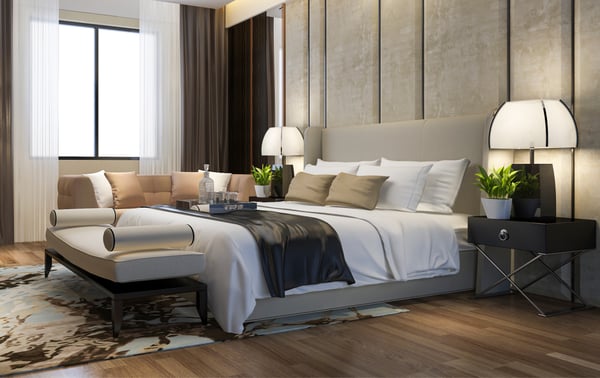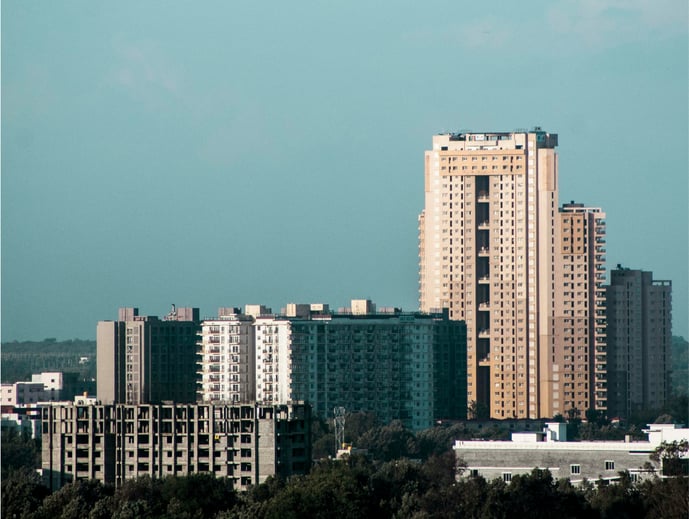
Corporate housing offers a cozier and more cost-effective alternative to hotels for business travelers—it strikes a balance between the homelike environment that supports productivity and well-being and the practical considerations of cost and location that are paramount for business travel. These fully furnished apartments are an ideal choice for extended business trips or relocations.
5 Key Differences Between Corporate Housing and Hotels
Serviced apartments and hotels serve similar purposes for business travelers but differ significantly in their offerings and experiences. Understanding these differences is important for travel managers and relocation specialists to make informed decisions about accommodation. This article explores the five key areas where they diverge to aid in selecting the best option for corporate extended stays.
1. Suitability for Different Travelers Needs
2. Comparing the Costs and Value for Money
3. Types of Accommodation and Amenities
4. Flexibility and Booking Terms
Why Corporate Housing is the Optimal Choice for Work Professionals
Browse for vetted corporate housing in the top destinations for business travel
1. Suitability for Different Travelers Needs
Corporate housing
Corporate housing primarily caters to business travelers, relocating employees, and professionals on extended projects who seek the comforts of home complimented with guest service. This audience typically requires accommodations for several weeks to months and often values additional space and the ability to maintain a regular day-to-day routine.
Corporate housing offers a residential atmosphere with full kitchens, living areas, and usually separate bedrooms, meeting the need for privacy, more space, and the convenience of in-house facilities like laundry. Corporate extended stay housing also appeals to travelers accompanied by family or those who may want to host colleagues, providing a more personal and homely environment than a standard hotel room.
Hotels
Hotels are ideally suited for tourists, short-term business travelers, and conference attendees who need temporary lodging for a few nights up to a week. These travelers typically prioritize location convenience, immediate accessibility to amenities, and the absence of long-term commitments.
Hotels may offer the advantage of on-site guest service such as daily housekeeping, in-room dining, and front-desk assistance, which appeal to those with a packed itinerary who value the efficiency of these services.
2. Comparing the Costs and Value for Money
Corporate housing
When evaluating the cost-effectiveness of corporate housing, it's important to consider the pricing structure, typically based on monthly rates. This longer-term arrangement often results in lower daily costs compared to hotels.
Additionally, corporate housing rates usually include all utilities such as electricity, water, internet, and TV services, providing a consolidated expense that can simplify budgeting for organizations. Including fully equipped kitchens allows for in-house meal preparation, which can significantly reduce dining costs over time.
Furnishings, housekeeping services, and amenities are often bundled into the rate, offering substantial value for money, particularly for travelers staying on prolonged stays.
Hotels
Hotel pricing is predominantly based on nightly rates, which can quickly accumulate, making it a costlier option than corporate housing apartments for extended stays. Hotels usually charge additional fees for services such as Wi-Fi access, parking, and breakfast, typically standard in corporate housing.
While the upfront cost of a hotel might appear less, these incremental charges can add up, especially for guests with a longer duration of stay. Moreover, the lack of in-room cooking facilities means guests are more likely to dine out, incurring greater expenses. However, for short-term travel, hotels can offer convenience and flexibility that may justify the cost for travelers not requiring the comprehensive amenities and space that corporate housing provides.
3. Types of Accommodation and Amenities
Corporate housing
Corporate housing primarily offers residential-style accommodations such as apartments, condominiums, and sometimes standalone houses. These accommodations offer the comforts of a home, with separate living, dining, and sleeping areas.
A significant feature of corporate housing is the inclusion of full-sized, fully stocked kitchens that enable guests to cook their meals, providing both a taste of home and big savings. In-unit laundry facilities add convenience, reducing the need for external services.
While room service is not a standard in corporate housing, many temporary housing providers partner with local services to offer housekeeping, grocery delivery, and even personal chefs upon request, ensuring a comfortable and personalized living experience.
Hotels
Hotels offer a spectrum of accommodations, from standard rooms to luxury suites. Standard hotel rooms typically provide a sleeping area and a bathroom, with more upscale options offering additional living space or enhanced luxury features. Suites often include separate bedrooms, living areas, and sometimes a small kitchenette, but rarely match the full kitchen facilities found in corporate housing or apartment communities.
Laundry services in hotels are usually offered via a third-party service and can be expensive. Room service is a hallmark of hotels, offering the convenience of meals delivered directly to the room, along with daily housekeeping and on-demand guest services. Hotel amenities provide comfort and convenience, particularly for shorter stays.
4. Flexibility and Booking Terms
Corporate housing
Corporate housing is known for its flexible leasing terms, catering to long-term stays ranging from a month to a year or more. This flexibility extends to tailored booking arrangements that can accommodate the ebb and flow of business needs, including project-based relocations or extended training sessions.
Cancellation policies tend to be more lenient with advance notice, as these are not typically booked night to night. Moreover, corporate housing providers often work with clients to adjust the length of stay as required, offering extensions without needing a new contract.
Hotels
Hotels, on the other hand, generally operate on a nightly booking system, with rates that fluctuate based on demand and season. While they offer more flexibility for short-term stays, cancellation policies can be strict, especially during peak seasons or special events, with late cancellations or changes fees.
Some hotels, particularly those catering to the business traveler, offer more relaxed cancellation policies as part of loyalty programs or corporate packages. Hotels might provide options for early check-in or late check-out, subject to availability, but they often come with additional charges.
5. Overall Pros and Cons
Corporate housing pros
- More room and privacy: A corporate apartment typically provide square footage, including separate bedrooms, catering to the needs of long-term travelers and those relocating with families.
- Cost-effective for extended stays: Longer-term contracts in corporate housing often come with rates that outmatch the average hotel room cost, especially for month-long stays or more.
- Home-like amenities: Corporate housing comes with all the features of a residential setting, such as fully stocked kitchens and in-unit laundry, for maximum convenience and comfort.
- Located in residential neighborhoods: Positioned away from the high-traffic areas expected in the hotel industry, AltoVita’s apartments offer a peaceful stay in studio apartments or larger units within tranquil communities.
- Customizable services: Many corporate housing companies provide flexible services and furniture options tailored to individual preferences, often avoiding the need for a security deposit.
Corporate housing cons
- Advance planning needed: Unlike many hotels catering to spontaneous travel, corporate housing often necessitates more lead time for bookings, aligning with the availability of temporary housing options.
- Limited on-demand services: Corporate housing may offer less daily housekeeping or room service in traditional hotels, prioritizing more room over such facilities.
- Less flexibility for short-term stays: There might be a more affordable option for a brief business accommodation.
Hotel pros
- Convenience for short stays: Hotels excel in providing accommodation tailored for short-term needs, often located in the heart of business districts.
- Full range of services: Guests staying at hotels enjoy daily housekeeping and on-site amenities, including fitness centers and business lounges, often justifying the additional pet fee or security deposit.
- Loyalty rewards: Regular travelers can benefit from loyalty programs, offering corporate travel savings and adding substantial value over time.
- Variety of locations: The array of hotels ensures convenience and easy access to local attractions and business centers.
Hotel cons
- Costly for more extended stays: The cumulative cost of nightly rates and potential additional fees can make hotels less economical for those considering a month-long stay.
- Smaller living space: Traditional hotel rooms and many suites offer less living area than corporate apartments' expansive layouts.
- Incidental expenses: Guests may incur extra charges for amenities like Wi-Fi and parking, typically included in the rate listed on a corporate housing platform.
- Public areas: The communal nature of hotel amenities means less privacy, an aspect where corporate housing options usually have the upper hand.
Why Corporate Housing is the Optimal Choice for Work Professionals
Corporate housing is the superior solution for professionals seeking comfort, convenience, and cost-effectiveness in their work-related accommodations. The tailored nature of corporate apartments caters specifically to the needs of business travelers, relocating employees, and long-term visitors.
Firstly, corporate housing provides a residential setting that mirrors the comforts of home, which is essential for professionals on extended stays. Including fully furnished living spaces, separate bedrooms and kitchens enables a seamless transition into a new city, fostering a sense of normalcy and stability.
Secondly, the cost benefits are considerable. Corporate housing options often offer more square footage at a lower or comparable cost to traditional hotels, especially when considering long-term stays. This affordability does not compromise amenities—residents still enjoy business centers, fitness centers, and sometimes even resort-style pools.
Moreover, the flexibility of corporate housing arrangements often includes utilities, reducing the burden of additional costs and simplifying budget management for both the individual and the corporate travel manager. Corporate housing can result in significant savings for companies, as negotiated monthly rates are typically more favorable than the cumulative cost of long-term, average hotel room stays.
Lastly, corporate housing locations are usually nestled in residential neighborhoods close to business districts, offering both the tranquility of a suburban area and the convenience of corporate apartments and proximity to workspaces.
Corporate housing is optimal for work professionals who value both efficiency and comfort in their lodging.
Browse for vetted corporate housing in the top destinations for business travel
Bleisure Travel Explained: Meaning, Benefits & Business Impact
Previous Article
.jpg?width=1800&height=949&name=Blog%20Banner%207%20(1).jpg)





























